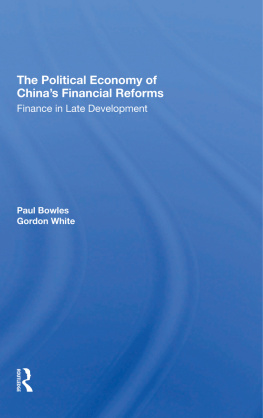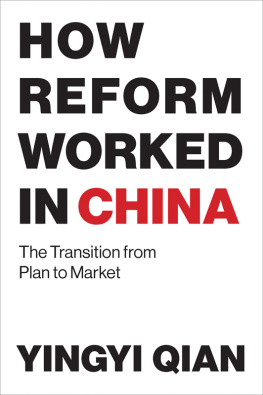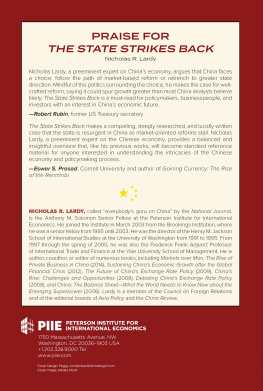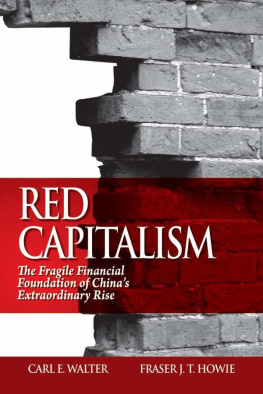The Political Economy of China's Financial Reforms
Transitions: Asia and the Pacific
Series Editor, Mark Selden
The Political Economy of China's Financial Reforms: Finance in Late Development, Paul Bowles and Gordon White
Reinventing Vietnamese Socialism: Doi Moi in Comparative Perspective, edited by William S. Turley and Mark Selden
FORTHCOMING
The Politics of Democratization: Vicissitudes and Universals in the East Asian Experience, edited by Edward Friedman
The World of the Ainu, Kayano Shigeru
The Origins of the Great Leap Forward, Jean-Luc Domenach
Unofficial Histories: Chinese Reportage from the Era of Reform, edited by Thomas Moran
Moving Mountains: Women and Feminism in Contemporary Japan, Kanai Yoshiko
Japanese Labor, Kumazawa Makoto
The Political Economy of China's Financial Reforms
Finance in Late Development
Paul Bowles and Gordon White
First published 1993 by Westview Press
Published 2019 by Routledge
52 Vanderbilt Avenue, New York, NY 10017
2 Park Square, Milton Park, Abingdon, Oxon OX14 4RN
Routledge is an imprint of the Taylor & Francis Group, an informa business
Copyright 1993 by Taylor & Francis
All rights reserved. No part of this book may be reprinted or reproduced or utilised in any form or by any electronic, mechanical, or other means, now known or hereafter invented, including photocopying and recording, or in any information storage or retrieval system, without permission in writing from the publishers.
Notice:
Product or corporate names may be trademarks or registered trademarks, and are used only for identification and explanation without intent to infringe.
Library of Congress Cataloging-in-Publication Data
Bowles, Paul.
The political economy of China's financial reforms: finance in
late development / Paul Bowles and Gordon White.
p. cm. (Transitions: Asia and the Pacific)
Includes bibliographical references and index.
ISBN 0-8133-8713-2
1. FinanceChina. 2. Financial institutionsChina. 3. China
Economic policy1976- . I. White, Gordon, 1942- . II. Title.
III. Series.
HG187.C6B69 1993
332'.0951dc20 93-28620 CIP
ISBN 13: 978-0-367-29487-8 (hbk)
To Fiona and Barbara
WE WOULD LIKE TO THANK the British Academy for funding a research visit to China in 1987 to initiate research on the financial reforms. We would also like to thank Maisie Gray for making available to us her research files and Julie McWiliiam and Bernadine Halliday for their assistance in the preparation of the manuscript.
Paul Bowles
Gordon White
1
Introduction
CHINA'S PROGRAMME of market-oriented economic reform has been under way since 1979. During the past thirteen years, there have been some remarkable changes in the structure and operation of the economy, particularly in the rural sector and in more "open" south-eastern coastal provinces such as Guangdong, Fujian and Zhejiang. In terms of welfare and productivity, the reforms have proven to be very successful. Continuing high growth rates have been accompanied by dramatic increases in per capita real incomes for both the urban and rural population and by significant improvements in factor productivity in both state and non-state sectors.
The reforms were premised on the need to introduce "market regulation" into the economy, partially to replace the centrally planned and administered allocation of resources. In comparison to former state socialist counterparts in east and central Europe, China started reforms both late and early: late in relation, say, to Hungary, which had been experimenting with a comparably market-oriented "New Economic Mechanism" since 1968, and early in relation to the Soviet Union, which did not begin until the late-1980s. Compared to east-central European developments, the Chinese experience of reform has been distinctive in several respects: The reforms have been pushed much faster and further; they have not been accompanied or preceded by substantial political reforms, as in the Soviet case; in economic terms, they have been far more successful; and as of the time of writing in late 1992, they have not culminated in a spectacular and comprehensive collapse of the pre-existing state socialist political and economic system. The dramatic events of 1989-1991 have left China as virtually the only socialist country (with the exception of Vietnam) which is still engaged in a "market socialist" project, theoretically in transition from an old to a new form of "socialist" economy, in contrast to the post-socialist countries of east/central Europe, which are now involved in a seemingly ineluctable yet highly tortuous transition to some form of capitalism.
A central element of the reform programme in China has been a wide-ranging attempt to construct a new financial system. We use the term financial to denote financial institutions and flows outside of the state budgetary system, where a parallel process of fiscal reform has been under way since 1979. The financial system channels financial resources, representing generalised command over physical resources, between savers and lenders, influences the rate of saving and the forms which it can take, and allocates purchasing power between lenders and thereby influences both the overall developmental process and the behaviour of micro-economic actors within it. The central thrust of reform has been towards a more flexible, variegated and competitive financial system, premised on the view that organising financial resources more effectively and allocating them more efficiently can bring substantial productivity benefits to the real economy.
While the monobanking system which was used in all Soviet-type economies is now discredited in China, the nature of an alternative financial system has been a matter of much dispute, raising a complex set of thorny issues: What range of financial assets should be available to savers? How should the banking system be organised? On what basis should resources be allocated to lenders? What role should the state play and what should be left to financial markets? What methods can be used to ensure macroeconomic balance? What impact do the reforms in the financial system have on other reformsare they complementary or contradictory? How best should financial reforms be introduced and how can any potentially problematic consequences of the reform process, such as inflation, be avoided or contained? This is the territory we aim to explore.
There has been many a scholarly treatise written on the Chinese economic reform process as a whole as well as on particular sectors of the economyespecially agriculture, industry and foreign tradeand on specific policy areas such as labour, wage and price reform. The financial sector has, however, been relatively neglected in the academic literature until very recently (Byrd 1983 was a notable exception); however, the World Bank has produced a large volume of relevant literature in successive mission reports (for example, World Bank 1988 and 1990b). This relative neglect may partly reflect an implicit desire to focus on what is perceived as the "real" economy, a perspective which assigns a relatively marginal role to finance; it may also reflect a view that financial economics and financial systems are highly arcane and technical areas which are the province of a relatively small group of "money doctors" whose experience, expertise and conceptual universe are somewhat alien to the more mundane world of applied development economics. It is our belief, however, that the financial system plays a critical role in the development process, dealing centrally as it does with the mobilisation and allocation of resources, and deserves closer examination. Our objectives in this study are three: first, to understand the origins of, and rationale for, financial reform in the Chinese context; second, to sketch the specific character and impact of the reforms during the period 1979 to 1992 using a fairly broad brush; and third, to assess the likely evolution of the reforms in future. In so doing, we should stress that we do not believe that the financial reforms can be "separated" from other parts of the reform programme or the forces shaping the reform process as a whole. Thus, while our focus is on the financial reforms, we shall also refer to the evolving political economy of the reforms as a whole.










